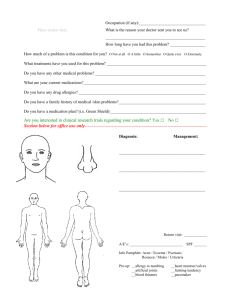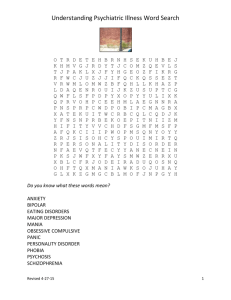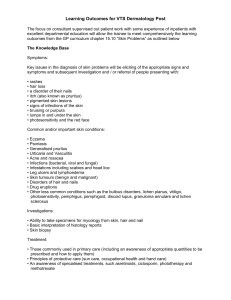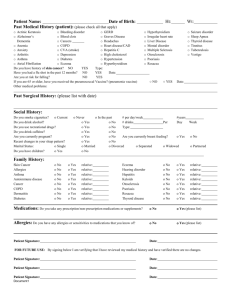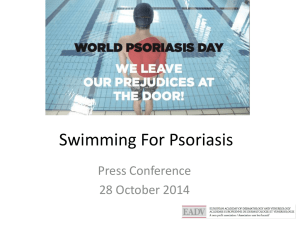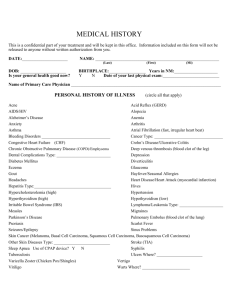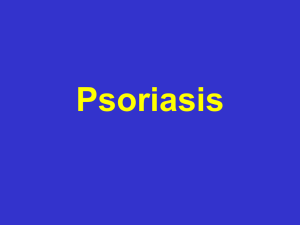Study on Psychiatric Co-Morbidity in Psoriasis”.
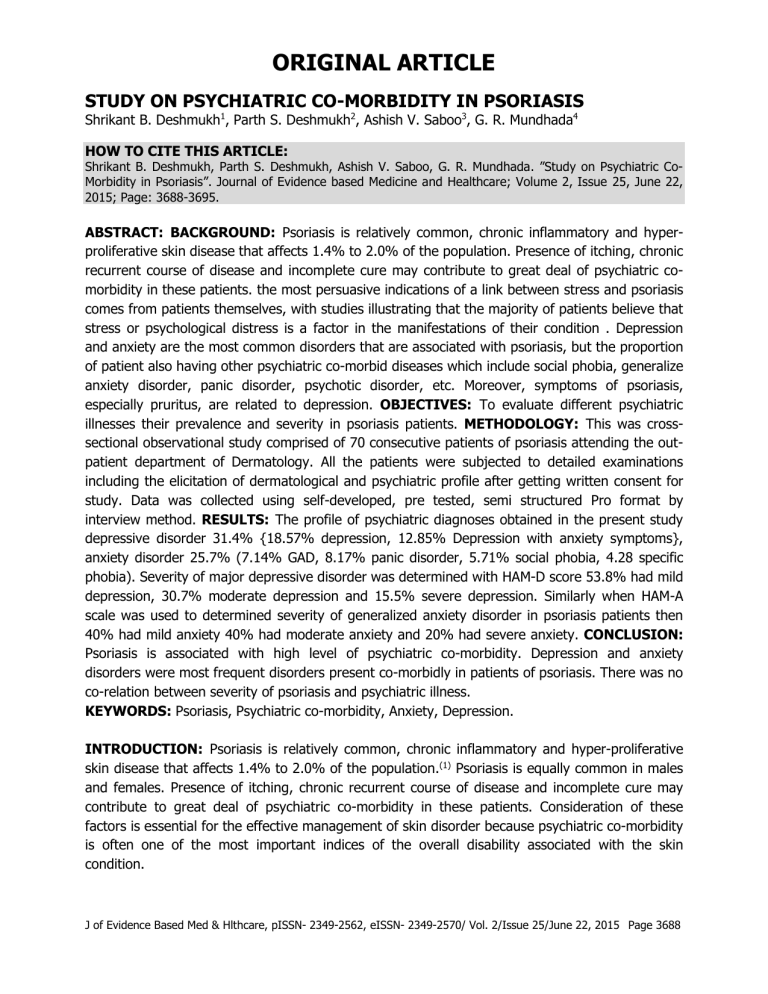
ORIGINAL ARTICLE
STUDY ON PSYCHIATRIC CO-MORBIDITY IN PSORIASIS
Shrikant B. Deshmukh 1 , Parth S. Deshmukh 2 , Ashish V. Saboo 3 , G. R. Mundhada 4
HOW TO CITE THIS ARTICLE:
Shrikant B. Deshmukh, Parth S. Deshmukh, Ashish V. Saboo, G. R. Mundhada. ”Study on Psychiatric Co-
Morbidity in Psoriasis”. Journal of Evidence based Medicine and Healthcare; Volume 2, Issue 25, June 22,
2015; Page: 3688-3695.
ABSTRACT: BACKGROUND: Psoriasis is relatively common, chronic inflammatory and hyperproliferative skin disease that affects 1.4% to 2.0% of the population. Presence of itching, chronic recurrent course of disease and incomplete cure may contribute to great deal of psychiatric comorbidity in these patients. the most persuasive indications of a link between stress and psoriasis comes from patients themselves, with studies illustrating that the majority of patients believe that stress or psychological distress is a factor in the manifestations of their condition . Depression and anxiety are the most common disorders that are associated with psoriasis, but the proportion of patient also having other psychiatric co-morbid diseases which include social phobia, generalize anxiety disorder, panic disorder, psychotic disorder, etc. Moreover, symptoms of psoriasis, especially pruritus, are related to depression. OBJECTIVES: To evaluate different psychiatric illnesses their prevalence and severity in psoriasis patients. METHODOLOGY: This was crosssectional observational study comprised of 70 consecutive patients of psoriasis attending the outpatient department of Dermatology. All the patients were subjected to detailed examinations including the elicitation of dermatological and psychiatric profile after getting written consent for study. Data was collected using self-developed, pre tested, semi structured Pro format by interview method. RESULTS: The profile of psychiatric diagnoses obtained in the present study depressive disorder 31.4% {18.57% depression, 12.85% Depression with anxiety symptoms}, anxiety disorder 25.7% (7.14% GAD, 8.17% panic disorder, 5.71% social phobia, 4.28 specific phobia). Severity of major depressive disorder was determined with HAM-D score 53.8% had mild depression, 30.7% moderate depression and 15.5% severe depression. Similarly when HAM-A scale was used to determined severity of generalized anxiety disorder in psoriasis patients then
40% had mild anxiety 40% had moderate anxiety and 20% had severe anxiety. CONCLUSION:
Psoriasis is associated with high level of psychiatric co-morbidity. Depression and anxiety disorders were most frequent disorders present co-morbidly in patients of psoriasis. There was no co-relation between severity of psoriasis and psychiatric illness.
KEYWORDS: Psoriasis, Psychiatric co-morbidity, Anxiety, Depression.
INTRODUCTION: Psoriasis is relatively common, chronic inflammatory and hyper-proliferative skin disease that affects 1.4% to 2.0% of the population.
(1) Psoriasis is equally common in males and females. Presence of itching, chronic recurrent course of disease and incomplete cure may contribute to great deal of psychiatric co-morbidity in these patients. Consideration of these factors is essential for the effective management of skin disorder because psychiatric co-morbidity is often one of the most important indices of the overall disability associated with the skin condition.
J of Evidence Based Med & Hlthcare, pISSN- 2349-2562, eISSN- 2349-2570/ Vol. 2/Issue 25/June 22, 2015 Page 3688
ORIGINAL ARTICLE
Generally, approximately one in four patients experience significant psychological distress.
In fact, one of the most persuasive indications of a link between stress and psoriasis comes from patients themselves, with studies illustrating that the majority of patients believe that stress or psychological distress is a factor in the manifestations of their condition.
(2) Depression and anxiety are the most common disorders that are associated with psoriasis, but the proportion of patient also having other psychiatric co-morbid diseases which include social phobia, generalize anxiety disorder, panic disorder, psychotic disorder, etc. Moreover, symptoms of psoriasis, especially pruritus, are related to depression.
Aetiology of psoriasis is still not known. It comprises a range of assumptions and very complex etiological and patho-genetic mechanisms. Mental disorders could be one of the factors which have a significant role in those mechanisms but also important effects on the very illness and its forecasts. If that is true, need for multidisciplinary approaching medical treatment of this disease is justified. Even Aristotle suggested that there is a link between mood and physical health. During the last few decades, investigators’ interest for establishment of link between mental disorders and psoriasis has grown increasingly. For example, in his most recent investigations, Akayo suggested that there is a link between psoriasis and depression and Kirby implied that there is a more frequent incidence of depression and anxiety in patients suffering from psoriasis. According to Parafianowicz and Szumanski, (3) it is evident that depression and anxiety disorder can be the cause of psoriasis. Investigators are making attempts to clarify this link. One of assumptions was that in individuals who are predisposed in terms of genetics, various mental disorders which are developed in lifetime or exposure to stress situations might create needed endogenous eruptive pressure which can induce immunological mechanism which is responsible for accelerated proliferation and differentiation of keratinocytes.
The psychosocial milieu of the developing countries being different from that of the developed countries and with only a limited amount of psychosocial research on psoriasis being available from India. The present study will help to compare data between developed and developing countries. The present study will help to provide more data on psychological aspect of psoriasis.
AIMS AND OBJECTIVES: To study prevalence and severity of psychiatric disorders in patients of psoriasis and their co-relation with psoriasis.
MATERIALS AND METHOD: This was cross-sectional observational study comprised of 70 consecutive patients of psoriasis aged between 14-65 years, suffering from psoriasis for at least 6 months, attending the out-patient department of Dermatology of medical college. All the patients were subjected to detailed examinations including the elicitation of dermatological and psychiatric profile after getting written consent for study.
J of Evidence Based Med & Hlthcare, pISSN- 2349-2562, eISSN- 2349-2570/ Vol. 2/Issue 25/June 22, 2015 Page 3689
ORIGINAL ARTICLE
RESULTS:
Characteristics
Age in Years
Gender
Marital Status
Educational Status
Categories
>14 – 24
>24 – 34
>34 – 44
>44 – 54
>54 – 64
Male
Female
Unmarried
Married
Widowed
Uneducated
Primary
Secondary
Higher Secondary
Graduate
Frequency %
13 18.57
12
15
17
13
45
25
16
48
6
12
15
16
8
3
17.14
21.42
24.28
18.57
64.28
34.72
22.85
68.57
8.57
23
28
30
15
4
Table 1: Represents the data regarding socio-demographic characteristics of psychotic patients\ characteristics
N = 70
Particulars
Psychiatric Illness
No Psychiatric Illness
No. of Patients Percentage
40
30
57.14
42.86
Total 70 100
Table 2: Distribution of Patients of Psoriasis
Table 2 shows that prevalence of psychiatric disorders in psoriasis patients.
Psychiatric diagnosis Psychiatric specific diagnosis Number Percentage
Depression
Depression & Anxiety
MDD
MDD- Anx
13
9
18.57
12.85
Anxiety disorders
GAD
Panic disorder
Social phobia
Specific phobia
5
6
4
3
7.14
8.57
5.71
4.28
No psychiatric illness
Total
Table 3: Distribution of Psychiatric Disorders
30
70
42.85
100
J of Evidence Based Med & Hlthcare, pISSN- 2349-2562, eISSN- 2349-2570/ Vol. 2/Issue 25/June 22, 2015 Page 3690
ORIGINAL ARTICLE
MDD: Major depressive disorder.
MDD-Anx: Major depressive disorder with anxiety symptoms.
GAD- Generalized anxiety disorder.
As seen from the above table, among 70 case of Psoriasis, 40 patients were found to have at least one psychiatric diagnosis. Type and distribution of psychiatric diagnoses are MDD- 13 cases (18.57%), MDD with anxiety symptoms - 9 cases (12.85%), generalized anxiety disorder- 5 cases (7.14%), panic disorder- 6 cases (8.57%), social phobia 4 cases (5.71%), specific phobia 3 cases (4.28%) and no psychiatric illness 30 cases (42.85%). It appears that MDD and MDD with co-morbid anxiety evolve as major psychiatric diagnostic category in psoriasis patients viz 21 cases (30%).
Depression severity
PASI Score
Mild (0-3) Moderate (>3-15) Severe (>15-72)
Total
Mild (14-18) 4(57.1 %) 3(42.85%) 0(0%) 7(53.8%)
Moderate(19-22) 1(25%)
Severe(23-72) 0(0%)
1(25%)
2(100%)
2(50%)
0(0%)
4(30.7%)
2(15.3%)
Total
Table 4: Association of severity of depression with PASI score of psoriasis
13 r= -0.9, p=0.515
GAD severity
Mild
Moderate
Severe
Total
Mild
1(50%)
1(50%)
0
2(40%)
PASI Score
Moderate Severe
1(50%)
1(50%)
1(100%)
3(60%)
0
0
0
0
Total
2(40%)
2(40%)
1(20%)
5
Table 5: Association of severity of GAD with PASI score of psoriasis r=0.1, P=0.873
As seen in tables 4 & 5, Severity of depressive disorder on Hamilton depressive rating scale and anxiety disorder on Hamilton anxiety rating scale in psoriasis patients was observed from above tables. No of cases of mild, moderate and severe cases of depression were 7, 4 and 2 respectively. Out of 7 case of mild depression, 4 cases suffered from mild form while 3 had moderate form of psoriasis, none had severe psoriasis. Likewise, there were 4 cases of moderate
J of Evidence Based Med & Hlthcare, pISSN- 2349-2562, eISSN- 2349-2570/ Vol. 2/Issue 25/June 22, 2015 Page 3691
ORIGINAL ARTICLE depression, out of which 1 had mild, 1 had moderate and 2 had severe psoriasis, 2 cases of severe depression were found and both of them had moderate form of psoriasis. Out of 13 patients of depression, 5 had mild, 6 had moderate and 2 had severe form psoriasis.
No. of cases of mild, moderate and severe cases of GAD were 2, 2 and 1 respectively. Out of 2 case of mild GAD, 1 case suffered from mild form while 1 had moderate form of psoriasis none had severe psoriasis. Likewise, there were 2 cases of moderate severity of GAD out of which 1 had mild, 1 had moderate form of psoriasis none had severe psoriasis. Single case of severe form of GAD had moderate form of psoriasis was observed. Out of 5 patients of GAD, 2 suffered from mild, 3 from moderate form of psoriasis none had severe psoriasis.
When spearmen correlation coefficient procedure was used to rank variable and find association then no correlation was observed between severity of psoriasis and depression and severity of psoriasis and anxiety.
DISCUSSION: It is very essential to consider psychiatric aspect of psoriasis. The purpose of the study was to find prevalence of psychiatric disorder commonly associated with psoriasis, their severity and association between psoriasis and psychiatric illnesses. Psoriasis is a chronic relapsing disease of the skin with 1-2% prevalence in the general population. Both the genetic and environmental factors are believed to play an important part in the pathogenesis of this disorder (Stefan Jenisch and Enno Christophers).
(4) Many studies support the view that dermatological conditions carry a high degree of psychiatric morbidity. Prevalence of psychiatric co-morbidity varies from 10-90% in all these studies.
The profile of psychiatric diagnoses obtained in the present study depressive disorder
31.4% (18.57% depression, 12.85% Depression with anxiety symptoms), anxiety disorder 25.7%
(7.14% GAD, 8.17% panic disorder, 5.71% social phobia, 4.28 specific phobia) was in contrast to that of other studies reporting 50%-97% depressive disorders, and 15%-50% anxiety disorders on standardized psychiatric diagnosis in psoriasis outpatients (Attah Johnson & Mostaghimi, 1995;
Bharath et al, 1997).
(5,6) The present study did not find any excess representation of females among the psychiatrically ill psoriasis subjects. A similar study conducted by Pulimood et al
1996, (7) in dermatological inpatients showed that 9% were having psychiatric illness.
(7) Our findings were similar to study done by Vivek Mehta, S. K. malhotra et al (8) who found in psoriasis patients depression (28%) followed by suicidality (6%), alcohol abuse and dependence (6%), psychotic disorder and mood disorder with psychotic features (4%), generalized anxiety disorder
(4%), social phobia (2%) and dysthymia (2%).
Our findings are in between with the results of previous studies of Bharath et al, 1997, (6) found prevalence of depressive disorder in 47.6% of subjects with psoriasis and Sharma et al.,
2001 (9) found prevalence of depressive disorder in 23.3% in psoriasis and anxiety was observed in 3.3%.
Kadri et al., 2007 (10) found prevalence of anxiety disorders in general population using
MINI. Prevalence of panic disorder, generalized anxiety disorder social phobia in general population 2%, 4.3%, 3.4%. In our study 8.17% panic disorder, 7.14% generalized anxiety disorder, 5.71% social phobia, 4.28 specific phobia. This suggests high prevalence of various anxiety disorders in psoriasis patient compared to general population.
J of Evidence Based Med & Hlthcare, pISSN- 2349-2562, eISSN- 2349-2570/ Vol. 2/Issue 25/June 22, 2015 Page 3692
ORIGINAL ARTICLE
When severity of depression was determined with HAM-D score 53.8% had mild depression, 30.7% moderate depression and 15.3% severe depression. In all these patient’s degree of severity of psoriasis was determined with PASI score and further correlation was done with spearmen’s correlation coefficient to find increase in severity of psoriasis associated with increase in severity of psychiatric illness. The result showed that there was no such association.
Similarly when HAM-A scale was used to determine severity of anxiety in psoriasis patients then
40% had mild anxiety 40% had moderate anxiety and 20% had severe anxiety. In all these patients degree of severity of psoriasis was determine with PASI score and further correlation was done with spearmen correlation coefficient to find association. There was no correlation in severity of psychiatric illness and severity of psoriasis was found.
Similar findings were suggested in study by Sharma et al., 2001 (9) in which psychiatric comorbidity did not correlate well with the severity of skin disease.
Similar to ours, O’Leary et al.’s (11) study showed that the magnitude of anxiety and depression in patients with psoriasis is higher than that in healthy individuals, but they found no association between severities of psoriasis with anxiety, whereas Harvima et al.
(12) found an association between psychological stress and clinical severity and symptoms in psoriatic patients.
They had found patients with significant psychological distress who had more severe dermatologic lesions and particular defects. The sample size in O’Leary and Harvima studies was
141 and 38 patients, respectively. Therefore, the sample size may lead into different results.
Accordingly, Wessley and Lewis (1989) argued that physicians and dermatologists should acquire skills for early identification and proper management of psychiatric morbidity. In addition, counselling, supportive psychotherapy, cognitive-behaviour therapy, group psychotherapy and low-dose antidepressants have been shown to alleviate such morbidity (Ginsburg, 1995; Picardi &
Abeni, 2001; Swanbeck G, 1983).
(13-15) The previous literature has attributed higher psychopathology to female gender, younger age, severity of illness, in studies done by Gupta et al, 1988 (16) and Roengink & Roengink, 1978.
(17)
All the patients diagnosed to have psychiatric disease were referred for consultation to psychiatrist in Department of Psychiatry and were given antidepressants and other psychiatric medication and psycho-therapy according to the diagnosis of the patients and were regularly followed up by psychiatrist.
As less number of studies are available from India, despite its limitations (a tertiary care hospital based small outpatient sample, lack of measurement of other relevant variables like psoriasis specific stressors, coping, quality of life, etc.), and a cross-sectional design.
This study significantly advances the literature of psoriasis and psychiatric outcomes in that it examines the incidence of clinical diagnosis of depression and anxiety in patients with psoriasis. Furthermore, the results remained robust to multiple sensitivity analyses, further ensuring the validity of the findings.
The mechanism of the causal relationship between skin diseases namely psoriasis, major depression, and anxiety is not known. It may be that the chronic nature of the diseases or the prospects of a more limited lifestyle associated with the skin disease is severe enough that this leads to thoughts that life is not worth living. It could also be that suicidal ideation is associated with an increased likelihood that one will have exacerbated, or poorer control over skin disease
J of Evidence Based Med & Hlthcare, pISSN- 2349-2562, eISSN- 2349-2570/ Vol. 2/Issue 25/June 22, 2015 Page 3693
ORIGINAL ARTICLE leading to more frequent physician visits. Furthermore, future studies that investigate whether and to what degree the treatment of depression is associated with improvement in skin disease, as well as the reverse, and the extent to which mental health care affects the risk of suicide behaviour also merit attention.
CONCLUSIONS: This cross-sectional observational study took place on 70 consecutive psoriasis patients at outpatient department of dermatology of medical college. After getting written consent, patients were asked to provide detail regarding demographic profile, psoriasis history and subjected to further dermatological and psychiatric study.
The present study concluded following findings:
1.
The prevalence of psychiatric morbidity in psoriasis patients was 57.14%.
2.
Depression and anxiety disorders were most frequent disorders present co-morbidly in patients of psoriasis.
3.
Mild form of depression and anxiety were more common in psoriasis patients.
4.
There was no co-relation between severity of psoriasis and psychiatric illness.
LIMITATIONS: This study took place on limited number of patients, mainly on patients from low socio-economic background. Patients were mainly from hospital and were on psoriasis treatment.
So, findings can-not be generalised to psoriasis patients in community and to those were not treated. Therefore further extensive cohort studies are necessary on large population to find prevalence in community sample and to find any etiological role of psychiatric disorders in psoriasis. Also, further studies are necessary to find improvement of psoriasis with treatment of psychiatric disorders.
REFERENCES:
1.
Rosa Parisi, Deborah P M Symmons, Christopher E M Griffiths and Darren M Ashcroft,
Global Epidemiology of Psoriasis: A Systematic Review of Incidence and Prevalence; Journal of Investigative Dermatology (2013) 133, 377–385.
2.
Farber, E. M., Rein, G. and Lanigan, S. W. (1991), Stress and Psoriasis. International
Journal of Dermatology, 30: 8–12.
3.
Parafianowicz K, Sicinska J, Moran A, Szumanski J, Staniszewski K, Rudnicka L, Kokoszka A.
Psychiatric comorbidities of psoriasis: pilot study. Psychiatr Pol. 2010; 44(1): 119-26.
4.
Jenisch S, Christophers E, Henseler T, Rajan P. Nair, Sun-Wei Guo, Eckhard Westphal, Philip
Stuart, Martin Krönke, John J. Voorhees, , James T. Elder. Linkage Analysis of Human
Leukocyte Antigen (HLA) Markers in Familial Psoriasis; Am. J. Hum. Genet.1998; 63: 191–
199.
5.
Johnson FA, Mostaghimi H. Co-morbidity between dermatologic diseases and psychiatric disorders in Papua, New Guinea. International journal of Dermatology 1995; 34: 244-248.
6.
Bharath S, Shamasundar C, Raghuram R, Subbakrishna DK. Psychiatric morbidity in leprosy and psoriasis-a comparative study. Indian journal of leprosy 1997; 69(4): 341-346.
J of Evidence Based Med & Hlthcare, pISSN- 2349-2562, eISSN- 2349-2570/ Vol. 2/Issue 25/June 22, 2015 Page 3694
ORIGINAL ARTICLE
7.
Pulimood S, Rajgopalan B, Rajgopalan M, Jacob M, Kohn JK. Psychiatric co-morbidity among dermatology inpatients. National medical journal India 1996; 9: 208-210.
8.
Vivek Mehta, S. K. Malhotra, Psychiatric evaluation of patients with psoriasis vulgaris and chronic urticaria, Indian journal Dermatology Venereology Leprosy. 2008 Nov-Dec; 74(6):
594-9.
9.
Sharma N, Koranne RV, Singh RK. Psychiatric co-morbidity in psoriasis and vitiligo: A comparative study. Journal of Dermatology 2001; 28: 419-423.
10.
Kadri N, Agoub M, Gnaoui SE, Berrada S, Moussaoui D. Prevalence of anxiety disorders: a population-based epidemiological study in metropolitan area of Casablanca, Morocco.
Annual general psychiatry 2007; 6: 6.
11.
O’Leary CJ et al perceived stress, stress attribution and psychological distresss in psoriasis,
Journal of psycho-dermatology Research 2004, 57(5), 465-71.
12.
Harvima RJ, Viinamäki H, Harvima IT, Naukkarinen A, Savolainen L, Aalto ML,
Horsmanheimo M. Association of psychic stress with clinical severity and symptoms of psoriatic patients. Acta Derm Venereol. 1996 Nov; 76(6): 467-71.
13.
Ginsburg IH psychological and psychosocial aspect of psoriasis, Dermatology Clinical 1995 oct, 13 (4); 793-804.
14.
Picardi A, Abeni D. Can cognitive-behavioural therapy help patients with vitiligo? Archive of
Dermatology 2001; 137: 786.
15.
Swanbeck G, Jobling R: Organization of psoriasis treatment and psychosocial aspects. Acta
Dermato- Venerol Suppl 112: 61-63, 1983.
16.
Gupta MA, Gupta AK, Kirkby S, Weiner HK, Mace TM, Schork NJ, Johnson EH, Ellis CN,
Voorhees JJ. Pruritis in psoriasis- a prospective study of some psychiatric and dermatologic correlates. Archive of Dermatology, 1988; 124: 1052-1057.
17.
Roengink PK, Roengink HH. Sex difference in psychological aspects of psoriasis. Cutis 1978;
21: 529.
AUTHORS:
1.
Shrikant B. Deshmukh
2.
Parth S. Deshmukh
3.
Ashish V. Saboo
4.
G. R. Mundhada
PARTICULARS OF CONTRIBUTORS:
1.
Professor and HOD, Department of
Psychiatry, Dr. Panjabrao Deshmukh
Memorial Medical College, Amravati.
2.
Senior Resident, Department of
Psychiatry, Dr. Panjabrao Deshmukh
Memorial Medical College, Amravati.
3.
Associate Professor, Department of
Psychiatry, Dr. Panjabrao Deshmukh
Memorial Medical College, Amravati.
4.
Associate Professor, Department of
Dermatology, Dr. Panjabrao Deshmukh
Memorial Medical College, Amravati.
NAME ADDRESS EMAIL ID OF THE
CORRESPONDING AUTHOR:
Dr. Parth S. Deshmukh,
Manas Clinic, Rukhmini Nagar,
Congress Nagar Road,
Amravati – 444606.
E-mail: dr.parthsdeshmukh@gmail.com
Date of Submission: 04/06/2015.
Date of Peer Review: 05/06/2015.
Date of Acceptance: 13/06/2015.
Date of Publishing: 18/06/2015.
J of Evidence Based Med & Hlthcare, pISSN- 2349-2562, eISSN- 2349-2570/ Vol. 2/Issue 25/June 22, 2015 Page 3695
